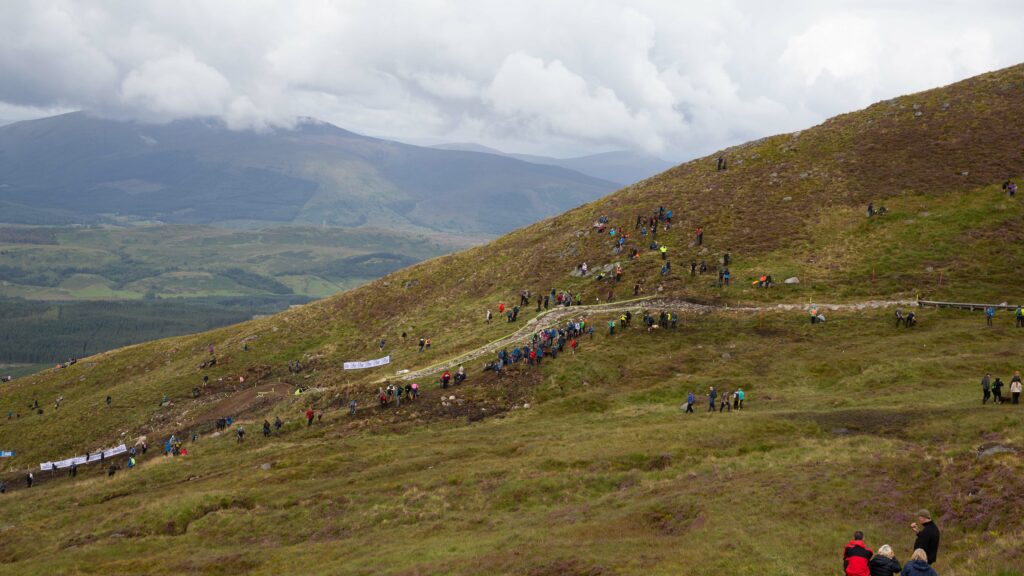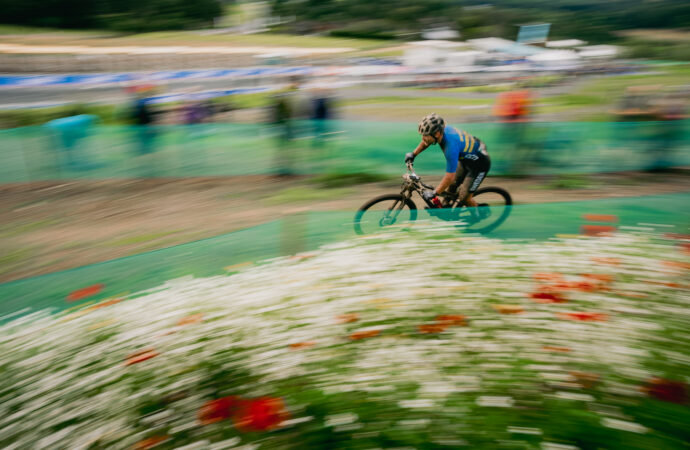A number of events at the 2023 event occurred in delicate natural ecosystems. We explore how UCI worked with several stakeholders to protect and enhance local biodiversity
As Mathieu van der Poel powered up Glasgow’s Montrose Street – a steep city centre road lined with Victorian charm and modern offices – on the way to winning the Men’s World Road Race Championships in August, he symbolised human endurance and the thrill of urban cycling.
Nature, flora and fauna were potentially not top of mind for the thousands of fans lining the streets to witness one of the summer’s most breathtaking sporting moments. However, with 13 world championships constituting the UCI 2023 Cycling World Championships, including events in remote spots like Nevis Range, Fort William, Tweed Valley and Glentress, preserving biodiversity and wildlife had to be for the organising committee.
The Nevis Range and Glentress were the most sensitive areas to host events. The former, known for downhill biking on Aonach Mòr, holds conservation designations including Ben Nevis Site of Scientific Interest (SSSI) and Ben Nevis and Glencoe National Scenic Area (NSA). The latter, an hour from Edinburgh in Scotland’s Tweed Valley, offers over 80 kilometres of trails for all skill levels, popular for hiking and wildlife, especially breeding osprey.
Regular surveillance and audits ensure responsible management of hill walking and biking. Event organisers went a step further to support these environmental efforts, documenting flora and fauna to prevent damage and enhance biodiversity.
In Glentress in particular, organisers knew that the 2023 UCI Cycling World Championships were going to result in the most people ever converging in that area at the same time. Over 1,000 hours were dedicated to monitoring, surveying and recording ecological factors for the Masterplan and Championships. This led to trail adjustments for wildlife protection, including the creation of Arwen Avenue from trees felled in Storm Arwen.
Additionally, organisers addressed wear, repaired turf and tackled invasive species. At the SSSI site, mountain biking access was limited to specific areas. In Glentress, Forestry and Land Scotland’s ‘Masterplan’ involved extensive wildlife surveys to safeguard ospreys, as well as bats, badgers, red squirrels and otters during 2023 UCI Cycling World Championships construction, including car parking, two bridges and new trails.
The event highlighted the accessibility of Scottish nature for cycling enthusiasts. But, even when presented uniquely, how were the biodiversity pressures and their significance for climate adaptation communicated to mountain bike spectators for actionable understanding?
“We are keen to engage with visitors to understand how a working forest, that also has recreation facilities, can work, be managed and add value back to the environment,” said Paul Andrews Garth, FLS project manager of the Glentress Masterplan.
Visitors to natural venues like Glentress were urged to respect plants and wildlife through the 2023 UCI Cycling World Championships’ ‘Keep it Clean’ guidelines, developed with IUCN, NatureScot and Scottish Forestry. These guidelines were shared on the event’s website and social media channels. Each venue had its own guide and ‘fun facts’ sections, catering to all age groups. In the Tweed Valley, this included osprey birdwatching tips.

This had the knock-on effect of promoting nature-based tourism opportunities throughout Scotland. Working with visitors and industry, VisitScotland became the first national tourism organisation to sign up to ‘Tourism Declares a Climate Emergency’.
“What does it mean to be a cycling friendly hotel or bed and breakfast?” Craig Burn, 2023 UCI Cycling World Championships director of policy, asks. “How would you wash your bike? Are there safe places to leave it? Have you thought about charging facilities because of e-bikes? Do you have information about where people can hire bikes from? Can we fill hotels in winter?”
To establish Scotland as a global cycling destination, the tourism industry must ponder these questions. Burn emphasises the necessity of integrating sustainability into the event’s core, having a dedicated individual overseeing it daily and disseminating sustainability practices throughout the team.
Engaging youth
The next generation will be living in a very different world to Glasgow in 2023, and, in addition to producing spectator guides for children attending 2023 UCI Cycling World Championships events, Scotland’s youth were engaged by the ‘Power of the Bike’ challenge.
The initiative was centred on teamwork, innovation, science and sustainability. While the competition was the focal point of The Championships, its impact is designed to endure long after the event. A significant focus was on safety, particularly for children without mobile phones. This involved integrating bike maintenance training to boost confidence in handling tasks like changing punctures. Additionally, the use of traffic-free facilities aimed to introduce people to cycling for the first time or enhance their riding proficiency.
“Give them a reason to take their bike to school, for goodness sake, and make it exciting!” says Burn.
Burn championed programmes targeting communities that typically lack access to cycling infrastructure, often due to a lack of bicycles. An illustration is the ‘Rock Up and Ride’ initiative by Scottish Cycling, providing free bikes for children to join BMX clubs and pump tracks.
He emphasises that this initiative owes its existence to the 2023 UCI Cycling World Championships and The Cycling Facilities Fund. This fund, supported by a £4 million commitment from the Scottish Government and an additional £4 million from sportscotland through National Lottery funds, aims to bolster cycling facility projects across Scotland.
The former head of Scottish Cycling is taking on the role of director of sport at sportscotland, where he aims to finalise initiatives left unfinished prior to the 2023 UCI Cycling World Championships, including the development of a national participation strategy for cycling.
“We have one for walking, but not cycling,” Burn says. “That’s something that we’ve got commitment from all of the policy advisory group, so I’m confident that will be produced. It will be a shining light for local authorities.”
Furthermore, Burn envisions the 2023 UCI Cycling World Championships’ legacy having different impacts on people, influenced by their social and geographical contexts, spanning both urban and rural environments. He sees potential in the Scottish Government’s role in advancing a collaborative national approach to cycling, marking it as a lasting legacy.
Opt into our weekly newsletter for exclusive content focused on sustainability strategy, communication and leadership for sport’s ecosystem.










Leave a Comment
Your email address will not be published. Required fields are marked with *